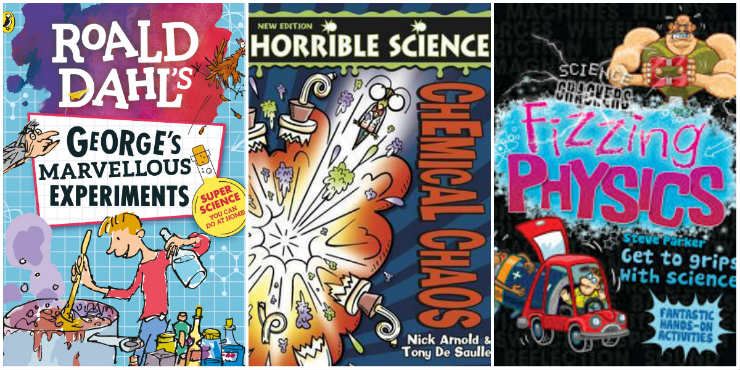
British Science Week 2017 runs from 10-19 March. What better excuse to pick up one of our science books for children?
Roald Dahl’s George’s Marvellous Experiments, by Barry Hutchinson & Quentin Blake
“George Kranky created his own Marvellous Medicine to deal with his grizzly old grunion of a Grandma. You definitely can’t do that at home (so don’t even try!), but here’s some amazing science that you can do! From concocting home-made slime to creating your own volcano, these fun experiments are all easily done, following simple step-by-step instructions and using everyday household objects.”
George’s Marvellous Experiments, a companion volume to Roald Dahl’s classic George’s Marvellous Medicine, is officially affiliated with British Science Week.
How Loud Can You Burp? And other extremely important questions (and answers) from the Science Museum, by Glenn Murphy & Mike Phillips
“How loud can you burp? Could we use animal poo to make electricity? Why is water wet, and is anything wetter than water? What’s the deadliest disease in the world? What are clouds for? What’s the difference between a brain and a computer?
“This is a wonderfully funny and informative book which helps us take a fresh look at the world (and universe) we live in, with no boring bits and an abundance of fascinating facts!”
Home Lab: exciting experiments for budding scientists, by Robert Winston
“Stir up some sticky slime, build a solar system with rubber bands, power a speedboat using soap, and construct an erupting volcano.
“Home Lab is packed with 28 brilliant projects, using clear step-by-step instructions, everyday ingredients that can be found around the house and amazing photography to guide you from start to finish. Plus fact-filled panels explain the science behind every experiment, as well as real-world examples providing a context to better understand scientific principles.”
100 Things To Know About Science, by Alex Frith, Minna Lacey, Jerome Martin, Jonathan Melmoth, Federico Mariani & Jorge Martin
“Science is a huge topic, but this book breaks it down into bite-sized chunks, making it an accessible introduction for anyone who wants to find out about this fascinating subject. Highly illustrated, in a pictorial, ‘infographics’ style, with snippets of information about all aspects of science from particle physics to genes and DNA.”
Chemical Chaos, by Nick Arnold & Tony De Saulles
“Chemical Chaos tells the stories of experiments that went horribly wrong, reveals the secrets of some very strange scientists, and shows readers how to try some experiments for themselves.”
This title is part of the Horrible Science series, which promises “science with the squishy bits left in.”
Fizzing Physics, by Steve Parker & Raman Prinja
“What shape is a magnetic field? How can you see with sound? How many colours are in a rainbow?
“Discover the incredible facts behind colour, sound and energy.
“Bursting with amazing images, fascinating facts and cool cartoons, Fizzing Physics is a great book for all budding physicists wanting to understand the physical world.”
